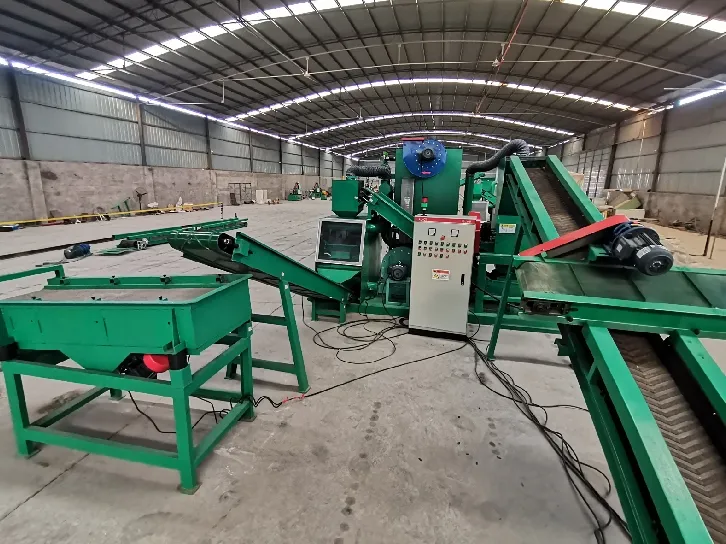

Dec . 18, 2024 00:28 Back to list
The Importance of Plastic and Metal Shredders in Waste Management
In recent years, the growing awareness of environmental issues has led to an increase in recycling efforts globally. Among the various technologies employed to facilitate recycling, plastic and metal shredders play a pivotal role. These machines are not only crucial in the recycling process but also reflect the industry's response to the pressing need for sustainable waste management solutions.
Understanding Plastic and Metal Shredders
Plastic and metal shredders are specialized machines designed to reduce large volumes of these materials into smaller, more manageable pieces. They function by employing rotatable blades or knives that cut, crush, or shred the materials into smaller fragments. This process is essential for further recycling methods, as smaller pieces are easier to handle, transport, and process.
Shredding is typically the first step in recycling, making it an invaluable part of the recycling chain. For instance, post-consumer plastics, often found in consumer packaging, must be shredded before they can be washed, melted down, and transformed into new products. Similarly, metal scraps from various industries are reduced in size to facilitate easier handling and processing in smelting operations.
Environmental Benefits
The environmental impact of shredders is significant. By breaking down plastics and metals, shredders help reduce the volume of waste sent to landfills. This is particularly important considering that plastics can take hundreds of years to decompose, leading to long-term environmental contamination. When plastic and metal materials are shredded and recycled, they can be reintroduced into the production cycle, thus conserving natural resources and reducing the need for new raw materials.
Recycling through shredding also leads to lower energy consumption compared to producing new materials from scratch. For instance, recycling aluminum can save up to 95% of the energy required to create new aluminum from bauxite ore. These energy savings contribute to a reduction in greenhouse gas emissions, making shredders integral to combatting climate change.
Economic Impact

Beyond environmental advantages, plastic and metal shredders hold significant economic benefits. The recycling industry generates substantial employment opportunities, and shredders are a vital part of this industry. As demand for recycled materials rises, so too does the need for efficient shredding operations. Investment in shredding technologies can lead to the creation of jobs not only in the operation of these machines but also in subsequent recycling and manufacturing processes.
Moreover, shredders help manage costs in waste management by enhancing the efficiency of material recovery. The ability to process large volumes of materials quickly makes shredding a cost-effective solution for businesses looking to minimize waste disposal fees. Companies that invest in shredding capabilities often find that they experience a reduction in their overall operational costs.
Technological Advancements
Innovations in shredding technology are continuously evolving, improving the efficiency and capabilities of these machines. Modern shredders are equipped with advanced features such as smart sensors, which can detect the type and size of material being processed, adjusting their operation accordingly for optimal performance. This not only enhances the shredding process but also reduces wear and tear, prolonging the lifespan of machinery.
Moreover, the integration of digital technology in shredding operations allows for real-time monitoring and data analytics, helping operators improve their processes based on actual performance metrics. These advancements contribute to more sustainable practices within the recycling industry.
Conclusion
Plastic and metal shredders are fundamental tools in the journey towards a more sustainable society. By facilitating the recycling of materials, they help reduce waste, conserve natural resources, and lower energy consumption. As the demand for recycling increases, the importance of these machines will continue to grow, showcasing their role in achieving both environmental sustainability and economic viability.
As we move forward, the recycling industry must embrace technological advancements and seek innovative solutions to enhance the efficiency of shredding operations. In doing so, plastic and metal shredders will remain at the forefront of waste management strategies, driving us toward a more sustainable future. By recognizing the vital role that shredders play in the recycling ecosystem, we can collectively work towards more effective waste management practices that benefit both the planet and future generations.
Latest news
Troubleshooting Common Eddy Separator Problems
NewsJul.04,2025
The Role of Metal Recycling Plants in Circular Economy
NewsJul.04,2025
The Impact of Recycling Line Pickers on Waste Management Costs
NewsJul.04,2025
Safety Features Every Metal Shredder Should Have
NewsJul.04,2025
How Industrial Shredders Improve Waste Management Systems
NewsJul.04,2025
How Cable Granulators Contribute to Sustainable Recycling
NewsJul.04,2025